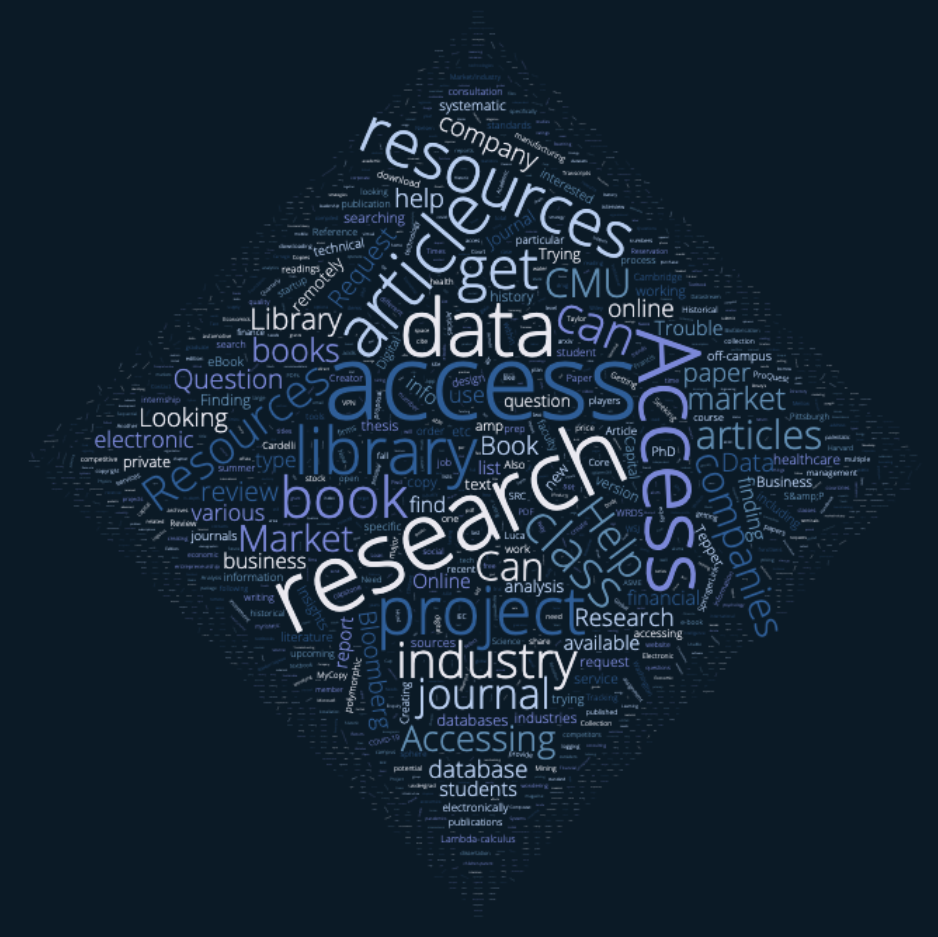
Like so many across the United States and the world, our campus library made the sudden transition to remote services this spring. As summer comes to an end, we've had time to look back and reflect: what happened during the last four months of remote operations? What content and services did our users most need; and what did we provide?
On Friday, March 20, library personnel packed up our files, laptops, mice, and project work, and headed home; prepared to hunker down for what might be several weeks of remote work. As weeks stretched into months, we saw jumps in demand for reference consultations; we expanded our content collections, and we adapted our programming and instructional offerings for a new remote format.
Here is a brief rundown of the community needs we saw and met through this period of time:
From March 1 through July 23, 2020, we handled at least 1,076 direct inquiries, significantly more than usual, primarily through live chat and e-mail. Many of these concerned how to access library resources remotely; whether and how to return books or extend loan periods; and how to quickly obtain digital access to course materials that both faculty members and students were accustomed to using in print.
We also addressed many needs and inquiries related to licensing, special and archival collections, and the needs of researchers engaged in publishing and disseminating their works, such as:
- Can students in my class utilize library e-books?
- Can the archives supply historical photos of Dietrich College?
- How do I use the Python OSMnx package to download Pittsburgh bus stop locations?
- Can you help me archive my research dataset in a publicly accessible location?
- How can I collect and archive newly published data and research on COVID-19?
- Where can I find floorplans for Sears homes?
- Can you help me find published research about how to convey empathy in virtual presentations and webinars?
In addressing these diverse inquiries, our small but mighty team of disciplinary, access, acquisitions, research and data experts came together to deliver thousands of consulting hours to the CMU community. We scanned hundreds of pages, acquired and shipped new materials directly to users' homes, and licensed or indexed thousands of additional e-resources made available by publishers to academic communities.
During this same period, our self-access library research guides netted more than 77,600 views, a massive 71% increase over the same period in 2019. Our six most popular research guides during this period have been:
- PhD Dissertation Defense Slides Design
- Newspapers
- Machine Learning and AI
- Music
- Expanded and Free Resources during COVID-19 Closure
- Visual Resources
Other fun facts from March-July 2020:
- Traffic on our live chat service increased 76%
- Use of our Databases A-Z list increased 10%
- CMU's Top 10 most used library e-books were:
- Building Intelligent Systems (2,239 uses)
- Springer Handbook of Robotics (2,015 uses)
- Artificial Intelligence in Education (1,666 uses)
- Medical Image Computing and Computer-Assisted Interventions (1,631 uses)
- Intelligent Tutoring Systems (1,542 uses)
- All of Statistics (1,526 uses) (by our very own, Larry Wasserman, UPMC Professor of Statistics and Data Science)
- Graph Theory (1,479 uses)
- The Science of Programming (1,243 uses)
- Machine Learning and Knowledge Discovery in Databases (933 uses)
- Image Analysis and Recognition (927 uses)
What lies ahead this fall? In anticipation of CMU's hybrid semester, the Libraries will reopen our buildings for limited services. Nearly all consulting, research support, instruction and training will remain online.
Based on evidence of demand from our expanded and trial services in the spring, we are growing e-resource collections in key areas. We recently expanded our subscription to the Journal of Visualized Experiments (JoVE), and are in the process of swapping subscriptions to unused journal titles for those with higher use. We have broadened our potential sources of streaming multimedia, and we continue to prioritize and increase the number of unlimited-user-access e-books purchased and made accessible in our collections.
And a new lineup of workshops for the fall semester, tailored to address our community's most pressing information needs and frequently asked questions will all be delivered online.
We'd love to hear your feedback and suggestions. Please get in touch!
- Alicia Salaz, Associate Dean of Research and Academic Services
